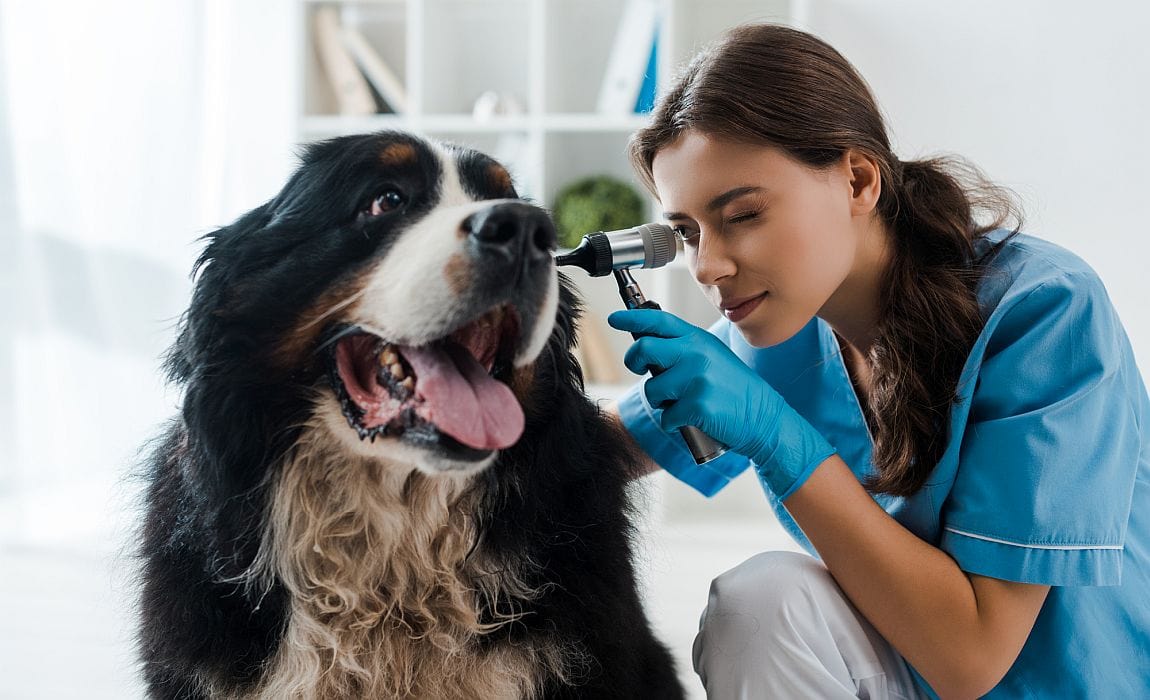If you’re a pooch parent, you’ve probably seen your dog itch his ears more than a couple of times. But while it’s normal for dogs to periodically scratch or flap their ears, excessive itching could be a sign of dog ear mites.
Dog ear mites are small parasites that can live in your dog’s ears, where they’ll cause incredible levels of irritation for your pooch. Fortunately, there are several ways you can treat ear mites in doggos.
We’ll explain the symptoms caused by dog ear mites and what to look out for below, along with some of the best treatment strategies available.
Dog Ear Mites: Key Takeaways
- Dog ear mites are tiny arachnids that can infest your dog’s ears and make him miserable. The bugs won’t bite your dog, but they’ll cause lots of itching and irritation as they creepy-crawly their way through your dog’s ears.
- Ear mites are highly contagious and often passed from one dog to the next. Additionally, ear mites can be transmitted to other species, including cats, ferrets, and — in rare cases — humans.
- There are several ways to treat ear mites. This includes medications your vet can prescribe, as well as some preventative flea treatments, which will kill the little buggers.
What Are Dog Ear Mites?
Ear mites are small external parasites that live primarily in the ear canals of dogs, cats, and ferrets. Like all mites, dog ear mites are arachnids who’re somewhat closely related to ticks.
More than one species of ear mite can cause problems for dogs, but 50% of canine ear mite infections are caused by the species Otodectes cynotis.

These highly contagious parasites live for about two months. It takes them about three weeks to complete their life cycle and develop from an egg to an adult mite. Ear mites feed on the wax and oil in your dog’s ears, but they don’t bite your pet. Instead, it is their movement and activity that will cause intense irritation for your pooch.
Over time, this itchiness and the resulting scratching from your dog can lead to infections and more serious damage. Therefore, it’s important to schedule a visit with your veterinarian as soon as you suspect your mutt may have ear mites.
Mites can be seen with the naked eye, but they’re usually about the size of a grain of salt making them difficult to identify without the help of a veterinary professional.
For the curious (and brave), a video of ear mites wriggling around:
How Do Dogs Get Ear Mites?
Unfortunately, ear mites are highly contagious.
These pesky parasites are typically spread to your dog through physical contact with an infected animal or after spending time in a high-risk environment.
Generally speaking, places where many dogs or other animals hang out are locations that are most likely to harbor ear mites. Therefore, you might want to consider cleaning your dog’s ears thoroughly after visiting dog parks, boarding facilities, or shelters.
Ear mites are also easily spread within the same household. If one of your dogs ends up hosting some of these pesky parasites, you’ll want to make sure all other animals in your home are checked and treated as needed.
Like many other canine ailments, ear mite infestations most commonly occur in puppies. However, they can affect dogs of all ages.
What Are the Symptoms of Ear Mites in Dogs?
Here are a couple of key symptoms to look out for that may indicate that your dog is suffering from ear mites.
- Itching — While it’s normal for dogs to itch a bit throughout the day, if you notice your dog scratching his ears more often than usual with excessive itching, it may be a sign he has ear mites. Ear flapping is another common sign of itchy ears in dogs.
- Ear Discharge — You may notice a reddish-brown dark crusty or waxy discharge coming from your dogs’ ears. The discharge might have a texture that’s somewhat reminiscent of coffee grounds. However, other types of medical problems can also cause ear discharges, so this doesn’t necessarily indicate the presence of ear mites.
- Hair Loss — Your dog may lose hair around his ears from the repeated scratching. The canine hair loss may occur on one or both ears, and it may affect the outer surface of the ear flap or any portion of the surrounding area.
- Open Wounds or Scratches — Look out for scratches, wounds, or abrasions of the inner ear skin, near the base of the ear, or the rest of the ear-adjacent area. These are caused by scratching and should be assessed by a veterinarian at once to prevent an infection from developing or progressing.
- Blood Blisters — Excessive ear scratching and flapping can cause blood to collect in the cartilage of your dog’s ears — a problem called an aural hematoma. This can be a painful condition for your pooch, which necessitates prompt veterinary attention.
Can Ear Mites Cause More Serious Problems?
In addition to being extremely irritating and painful for your pooch, ear mites can cause even more troubling issues if left untreated.
For example, your dog’s excessive itching scratching around the delicate ear area can cut the skin, opening the door to bacteria and other infections. This can lead to serious illness and require you to administer antibiotics and other medications — potentially over a lengthy period of time.
Ear mites can also be spread from one species to another, so your dog can infect your feline friend and vice versa. In fact, you may even contract ear mites from your dog in rare cases.
Given these possibilities, it’s best to treat ear mites as soon as you’re aware of their presence to protect your pooch and get rid of the budding infestation without too much hassle.
Diagnosing Ear Mites: What to Expect at the Vet

Your veterinarian will start by examining your dog’s ear canal and the surrounding area for signs of ear mites. He or she will likely use an otoscope, a medical instrument designed to view the ear canal in detail to identify whether or not your dog is plagued by the tiny pests.
Alternatively, your veterinarian may examine discharge from your dog’s ear with a microscope.
Keep in mind that these parasites can be extremely irritating, so your doggo may display signs of pain or resistance during the examination. In some cases, your veterinarian may recommend sedating your dog to allow for a problem- and stress-free examination.
From there, your veterinarian will recommend a personalized treatment plan for your pup, usually including some sort of prescription topical treatment to kill the mites and a cleaning routine with a dog-friendly ear cleaner to keep your dog’s ears clean.
He or she may also encourage you to use a preventative flea medication that’ll help keep the mites at bay.
Your vet might also recommend a recheck appointment within a couple of weeks to make sure that the infestation is fully eradicated.
There are over-the-counter medications for ear mites available.
However, it is still wise to check with your vet before administering these products. Your pet may have additional problems — such as fungal or bacterial infections — which will require separate treatment.
How Are Ear Mites Treated?

Ear mites are treated by killing off the mites with some sort or prescription medication.
These treatments come in oral forms, topical treatments, and more recently, a series of ivermectin injections. Note that the use of ivermectin for ear mite treatment is not FDA-approved, but this type of “off-label” drug use is pretty common in veterinary medicine.
These treatments are usually administered over a period of one day to three weeks depending on the method and severity of the infestation.
While these treatments will kill off the ear mites, you’ll still need to clean out the wax and debris left behind and treat any infections present.
Certain flea and tick prevention products like Bravecto have been proven to kill off and prevent ear mites, giving you yet one more reason to use a good preventative flea treatment.
Don’t have easy access to a vet? You may want to consider getting help from JustAnswer — a service that provides instant virtual-chat access to a certified vet online.
You can discuss the issue with them, and even share video or photos if need be. The online vet can help you determine what your next steps should be.
While talking with your own vet — who understands the ins and outs of your dog’s history — is probably ideal, JustAnswer is a good backup option.
How Can You Prevent Ear Mites?
Ear mites aren’t always avoidable and, as mentioned earlier, they are pretty common in dogs. However, there are some steps you can take to reduce your dog’s risk of hosting these pesky parasites:
- Clean Your Dog’s Ears Regularly — Cleaning Fido’s ears will not only keep him more comfortable, but it will also help keep the area free of wax and debris. In general, keeping your dog’s ears clean is a great way to keep your dog healthy and happy.
- Administer Flea and Tick Medication — Some monthly or quarterly flea and tick medication treatments like Bravecto can also ward off ear mites. Make sure you set a recurring administration date in your calendar so that your canine companion isn’t left unprotected.
- Be Cautious Around Dog Hot Spots — It’s a good idea to give your dog a thorough ear cleaning after spending time in areas frequented by other dogs and animals. Make a habit of cleaning your dog’s ears after trips to the vet, dog park, boarding facility, or anywhere else ear mites may be lurking.

Dog Ear Mite FAQs
Here are a couple of common questions and answers regarding ear mites in dogs so that Buddy can get back to feeling his best in no time.
Do ear mites affect people?
While ear mites can technically spread to humans from their canine or feline companions, this is somewhat of a rare occurrence. Dog ear mites might cause an itchy rash on susceptible people within the household, but this should go away once the infestation has been cleared.
Are there any home remedies for ear mites?
While there are home remedies for ear mites out there, it’s best to seek out personalized treatment from your veterinarian. Treatments that aren’t verified by your pup’s pooch practitioner could irritate the area or make the infestation worse. Additionally, some of the home remedies published on the web may actually exacerbate the problem and be painful or damaging to your pup’s ears.
Can dogs catch ear mites from other dogs?
Yes! In fact, if one of your dogs has ear mites, it’s likely that your other dog (and your cat, for that matter) has ear mites as well. Every animal in your household should be evaluated and treated as needed if you discover an ear mite infestation.
Can my dog catch ear mites from cats?
Unfortunately, yes. Dogs and cats can spread ear mites to one another. All canine companions and feline friends should be checked out upon discovering an ear mite infestation.
How can you tell ear mites from a yeast infection?
Unfortunately, these conditions are difficult to identify with the naked eye, which is why it’s so important to seek out care from your veterinarian. Your veterinarian will be able to identify the root cause of the issue.
Which essential oils will treat ear mites in dogs?
While you’ll find essential oil “treatments” claiming to alleviate ear mites in dogs online, these approaches are rarely backed by evidence-based research or studies. Since untreated ear mite infestations can cause serious problems and some essential oils are dangerous, it’s best to seek out individualized care from your veterinarian to keep your pooch safe. Unproven treatments will just make your pooch suffer for longer.
***
Ear mites are pesky parasites that can plague any pooch throughout his lifetime. Luckily, with the help of your veterinarian your mutt will be mite-free in no time at all.
Has your dog ever suffered from ear mites? How do you protect your pup from parasites? We’d love to hear all about it in the comments below!














Leave a Comment